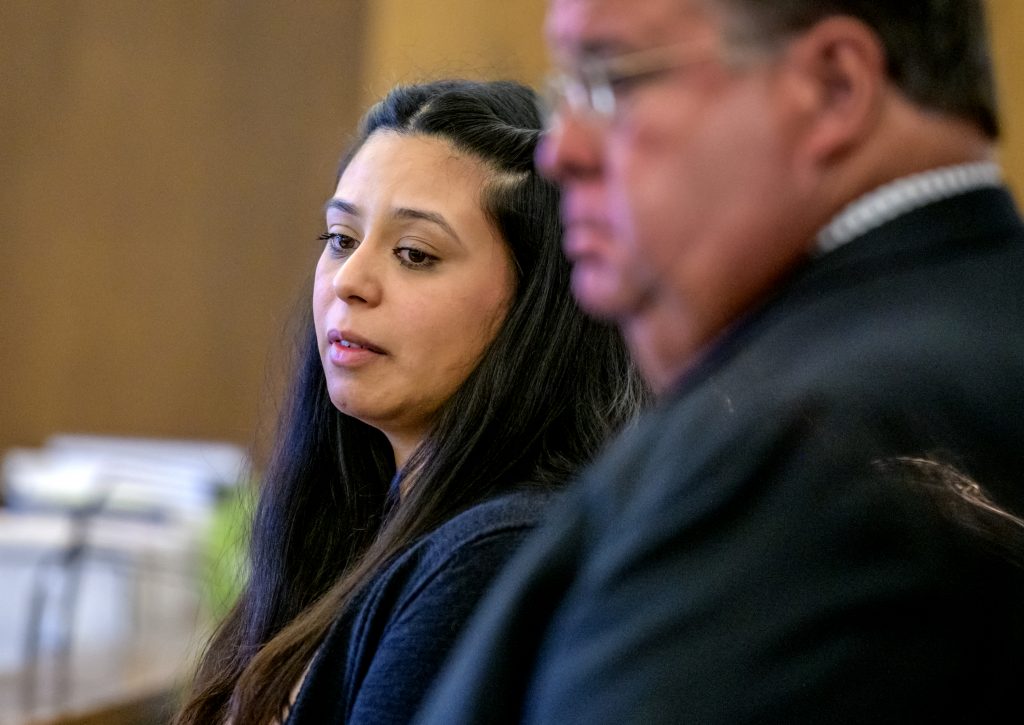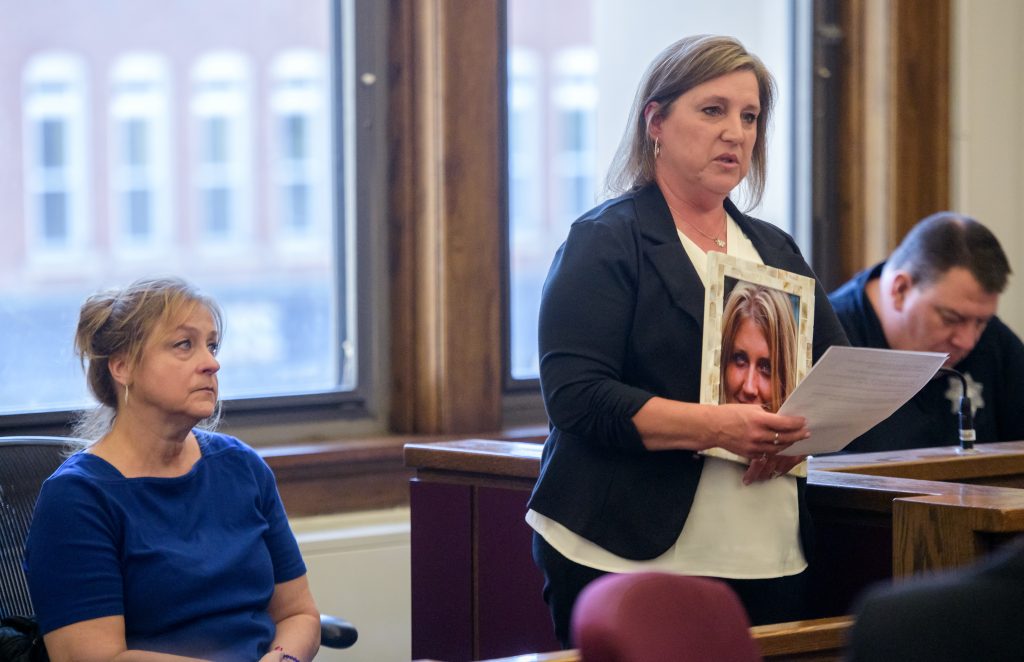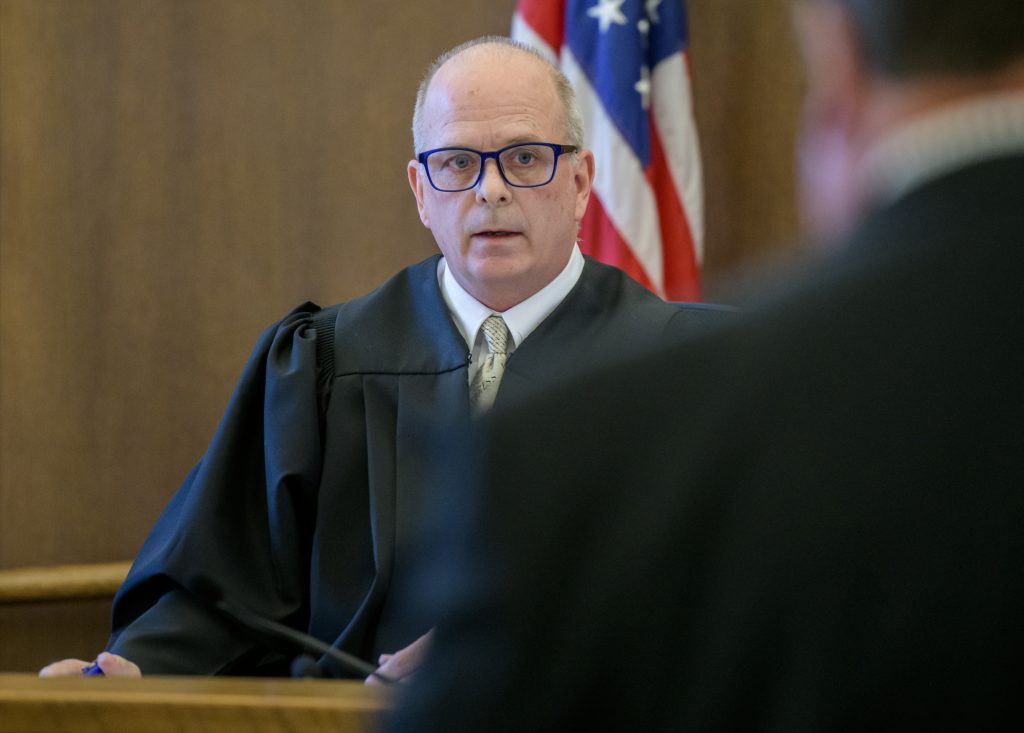
Former Bradley student Stephanie Melgoza was sentenced to 14 years in prison on Thursday as the result of striking and killing two pedestrians while driving drunk in East Peoria in April 2022.
Melgoza faced between six to 28 years in prison after pleading guilty without a plea deal to two charges of aggravated DUI and two charges of reckless driving. Three smaller charges were dropped during her plea. Each count of aggravated DUI carried a sentence range between three and 14 years.
Judge Tim Cusack and the Tazewell County Circuit Court’s sentencing of Melgoza included 14-year sentences for both aggravated DUI charges and a three-year sentence for aggravated reckless driving. One of Melgoza’s 14-year sentences and the three-year sentence will be served concurrently with the other 14-year sentence.
“I don’t believe this sentence to please anyone, but I believe it is the most just,” Cusack said.
Melgoza must serve at least 85 percent of her sentence before she can be released and will be subject to two years of mandatory supervised release. Additionally, she will receive credit toward her sentence for the time that she willingly spent at home as a result of the Safety Act that was enacted in Illinois on January 1, 2023.
On the night of April 10, 2022, Melgoza, who was a senior at Bradley at the time, struck and killed Andrea Rosewicz, 43, of Avon, Ohio and Paul Prowant, 55, of Seattle, Washington with her vehicle while driving near Throttle Bar in East Peoria. When officers arrived on the scene, they noted that Melgoza showed visible signs of impairment. According to Tazewell County Circuit Court records, Melgoza, who admitted to striking the pedestrians and called 911, later failed a field sobriety test and had a blood-alcohol content approximately three times the legal limit.
“I know words can’t help forget what happened, but I’m truly sorry from the bottom of my heart,” Melgoza said to the victims’ families on Thursday. “I never meant to hurt anybody. I’m so sorry for the pain I caused you. I’m sorry that they’re not here anymore and I will not forget them. I’ll live with this every day.”

Roughly a dozen of the victims’ family members were present in the courthouse for the sentencing. Prowant had recently been promoted to project superintendent with American Bridge Co. and was leading repairs on the McClugage Bridge. Rosewicz enjoyed her life alongside Prowant and both were happy to be in the Peoria area closer to their families and friends.
Many of the victims’ loved ones fought back tears, some unsuccessfully, and held pictures of the deceased while reading victim statements.
“The people here today are a small representative of the family and friends whose lives have been affected since you took them from us,” Rosewicz’s cousin, Lisa Schroeder, said to Melgoza. “We shouldn’t be here today, but for your actions, we are. Everyone makes mistakes but not to this degree.”
“There are no words that could even remotely come close to inflicting the pain and suffering anywhere near as much as you have inflicted on me, on our families and Andrea,” Rosewicz’s sister, Sherri Hutchison, added.
Following her arrest, Melgoza’s name appeared on Bradley University’s list of approved graduates, which provoked turmoil among the student body. Students held a vigil for the victims of the accident on the steps of Bradley Hall and wrote chalk messages protesting the university’s then-decision allowing her to partake in the commencement ceremonies if she chose to do so. However, a day after the vigil, Melgoza’s name was removed from the approved graduates list.
The Scout learned on Thursday that Melgoza still received her college diploma from Bradley after the university first moved to deny her the degree, according to Melgoza’s attorney Kevin Sullivan.
“I found that inherently unfair and frankly unconscionable [if she didn’t receive her diploma] because she put the time in,” Sullivan said. “She was in the eleventh hour of her college education and thank God the president of Bradley stepped in and said we’re not going to let her walk because that would be a distraction, but she is entitled, because she completed all of her classes, to her diploma.”
On multiple occasions, Sullivan indicated Melgoza’s remorse for her actions in conversations with his client, despite her stoic facial expressions for most of her court appearances. He said that upon her release from prison, Melgoza wants to educate others about the dangers of drinking and driving as an example.
“Hopefully, her legacy will be paying it forward so that she can prevent, prohibit or discourage this type of behavior among others,” Sullivan said.
“I will never, ever commit anything like that ever again,” Melgoza said. “Ever since that day, I planned to never drink ever again.”
The victim’s families and the state’s attorney expressed their wishes for Melgoza to be sentenced to the longest sentence allowed by the court.
“Because you chose to drink, get drunk and then drive, our family and friends have a sentence of daily pain and grief that grows greater each day,” Jennifer Prowant added. “But most importantly, Paul and Andrea have lost their lives…such precious gifts lost forever.”

Cusack noted that Melgoza’s timely plea, call to 911 dispatchers, compensation given to victims, no prior criminal history and her not having any intent to commit the crime were taken into account for the sentencing. He also emphasized that drinking and driving occurs far too often and hopes that others will learn from situations like these.
“Our system is based on punishment and rehabilitation. I have to balance them,” Cusack said. “But it is not all about rehabilitation, there is a sentence that is necessary to deter others and that needs to be out there … This is the easiest fatality in the U.S. to get rid of.”




